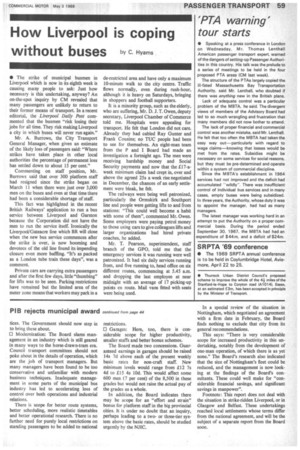PIB rejects municipal award continued from page 44
Page 61

If you've noticed an error in this article please click here to report it so we can fix it.
tices. The Government should now step in to bring these about.
El Modernization: The Board slams management in an industry which is still geared in many ways to the horse-drawn-tram era. Council transport committees should not poke about in the details of operation, which are the job of transport managers. But many managers have been found to be too conservative and unfamiliar with modern business techniques. Inadequate management in some parts of the municipal bus industry has led to accelerating loss of control over both operations and industrial relations.
There is scope for better route systems, better scheduling, more realistic timetables and better operational research. There is no further need for purely local restrictions on standing passengers to be added to national
restrictions.
El Garages: Here, too, there is considerable scope for higher productivity, smaller staffs and better bonus schemes.
The Board made two concessions. Guaranteed earnings in garages should be raised 14s 7d above each of the present weekly basic rates for non-craft stafff. New minimum levels would range from £12 7s 4d to £15 4s 10d. This would affect some 600 men (7 per cent) of the 8,500 in these grades but would not raise the actual pay of the grades as a whole.
In addition, the Board indicates there may be scope for an "effort and strain" bonus for platform staff in the big provincial cities. It is under no doubt that an inquiry, perhaps leading to a twoor three-tier system above the basic rates, should be studied urgently by the NJIC. In a special review of the situation in Nottingham, which negotiated an agreement with a firm date in February, the Board finds nothing to exclude that city from its general recommendations.
This says: "There is very considerable scope for increased productivity in this undertaking, notably from the development of one-man operation, of which there is as yet none." The Board's research also indicated that the size of Nottingham's fleet could be reduced, and the management is now looking at the findings of the Board's consultants. These could well make for "considerable financial savings, and significant savings in manpower".
Footnote: This report does not deal with the situation in strike-ridden Liverpool, or in Glasgow and Belfast. These undertakings reached local settlements whose terms differ from the national agreement, and will be the subject of a separate report from the Board soon.




































































































































































































































